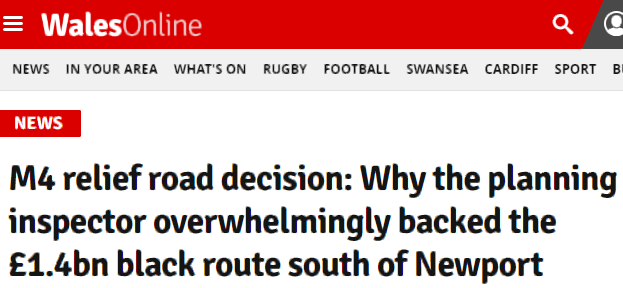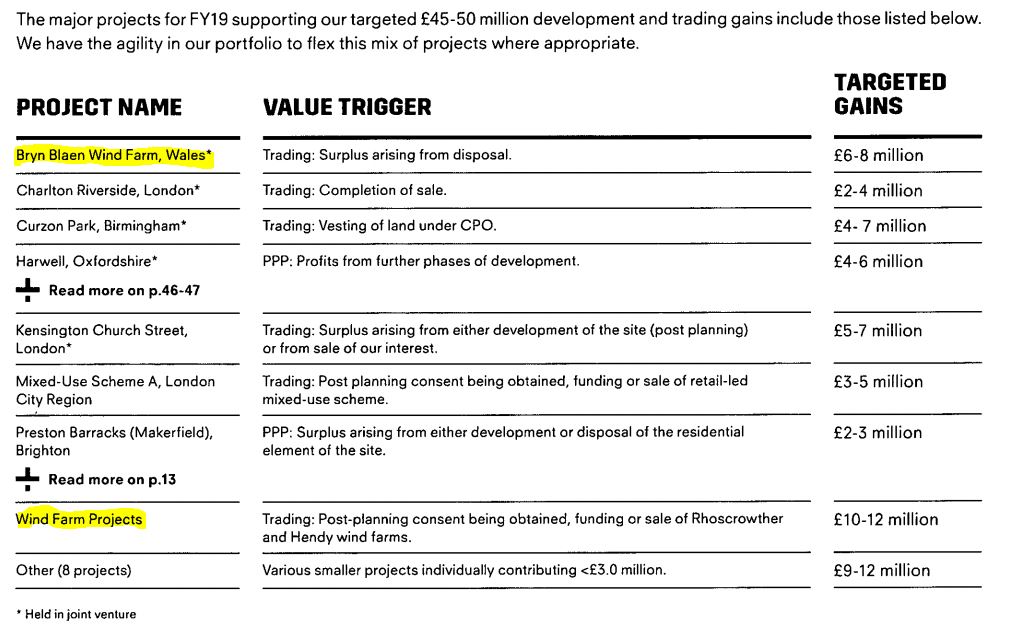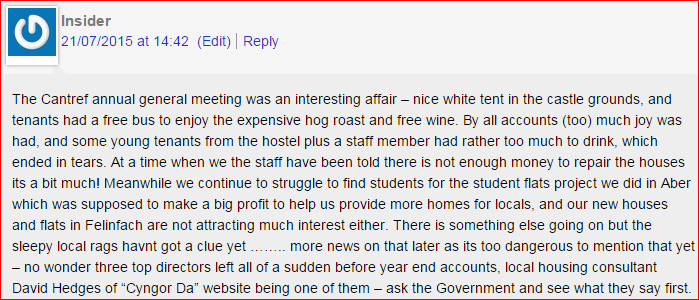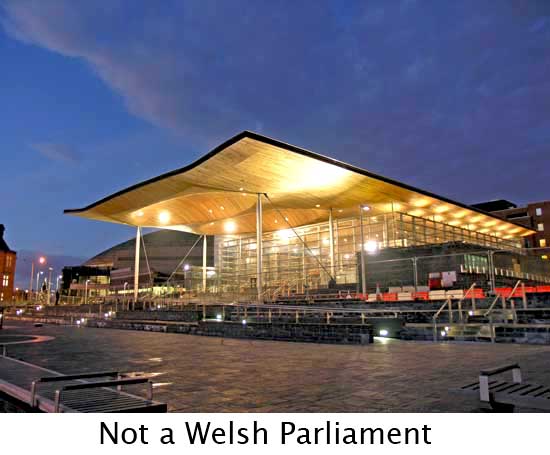PLEASE APPRECIATE THAT I GET SENT MORE INFORMATION AND LEADS THAN I CAN USE. I TRY TO RESPOND TO EVERYONE WHO CONTACTS ME BUT I CANNOT POSSIBLY USE EVERY BIT OF INFORMATION I’M SENT. DIOLCH YN FAWR
♦
I![]() ‘ve written about One Planet developments before, but to refresh your memories, and help newcomers, here’s a brief outline.
‘ve written about One Planet developments before, but to refresh your memories, and help newcomers, here’s a brief outline.
One Planet seems to be a generic term for a loose global network of people who believe in living a more environmentally-friendly lifestyle, both as individuals and communities. And who can argue with that?
The wider and diffuse One Planet movement may be global but Wales is the only country that has implemented OP legislation.
This came about because certain people realised that devolution coupled with malleable politicos offered a golden opportunity for them to live the lifestyle they wanted, wherever they liked, with no restraints. And even to have it funded.
It also opened the door to those who wished to cover Wales in wind turbines. Those grotesque machines that inflict more environmental damage in their production, transportation and erection than is ever recouped during their short and intermittent working lives.
Although the One Wales: One Planet document of May 2009 was signed by then first minister Rhodri Morgan the main driving force within the cabinet would appear to have been Jane Davidson, Minister for the Environment, Sustainability and Housing.

Another influence would have been Plaid Cymru, which from 2007 until 2011 was the junior partner in a coalition with Labour. For Plaid had been cosying up to multifarious Greens for a couple of decades, some of them pathologically anti-Welsh. But what the hell! if there’s virtue to be signalled then Plaid’s your party.
The One Planet legislation was supplemented with Technical Advice Note (TAN) 6 and the Well-being of Future Generations (Wales) Act 2015.
You can catch up with some of my earlier writing on this subject in: Fleece Jacket Fascists (01.08.2013); Plaid Cymru and the Green Party of Englandandwales (10.11.2014); Tryweryn, Happy Donkey Hill, Good-lifers (20.10.2015); The Green Smokescreen (05.09.2016); Hippies and associated problems (09.01.2018); The Green Menace (28.08.2018); The Welsh Clearances (16.10.2018).
♦
SO WHAT’S NEW?
The purpose of this posting is to bring you up to date, with examples of how the legislation mentioned in the previous section is damaging Wales. Also, how our local authorities and planning bodies are impotent in the face of land grabs because the aggressors have the full support of the ‘Welsh Government’, DEFRA, and the Planning Inspectorate.
And then, we come face to face with George Soros in the form of the Black Mountains College.
◊
MAENCLOCHOG
This example from north Pembrokeshire reminds us of how little support these eco-shysters receive from the indigenous communities. In Maenclochog, local councillor Huw George has even called for a moratorium on One Planet developments because, he argues, the system is being abused.
Councillor George has seen five OPD applications in his ward.

And of course he’s right when he argues that the system is being abused. Everyone who looks at how One Planet operates can see that the legislation is too lax. Another – and predictable – problem is that One Planet and associated legislation is of no benefit whatsoever to Welsh people. But it was never intended to be!
Think about that for a minute: a ‘Welsh Government’ passes legislation that it knows in advance will be of no benefit to Welsh people.
Making what is dressed up as saving the planet just another form of colonialism. Encouraged by an administration that may celebrate Welshness on an official and superficial level while simultaneously allowing or encouraging the destruction of the communities where that identity still thrives naturally.
◊
PARC TEIFI
Not far from Maenclochog, just over the county boundary in Ceredigion, we looked a few weeks ago at Parc Teifi. (Scroll down a bit when the link opens.) There the ‘Welsh Government’ ‘sold’ five acres on the outskirts of Cardigan town to Mr Alpay Torgut (late of Islington) and his friends for just £1.
The indefatigable Wynne Jones tried to find out a little more about this remarkable deal. For example, was a business plan submitted; and how is such generosity – with Welsh public assets – justified. But after a deluge of flim-flam the shutters came down. As they always do.

Anyone who takes an interest in the workings of the ‘Welsh Government’, and asks questions soon runs into a fog of obfuscation, which is usually the prelude to contact being ended completely. That’s because the ‘Welsh Government’ breaks its own rules, which then means that projects cannot be scrutinised or monitored.
Another feature is that many of those migrating to our rural areas to save the planet don’t want their children going to Welsh schools, or they think they can educate them better at home. This results in many kids just slipping off the radar, often with tragic consequences, as in the case of Dylan Seabridge.
I’m not suggesting that this boy’s parents, originally from Stoke on Trent, were involved in the One Planet scam; they just represent another type ‘escaping’ to our rural areas.
◊
BEEVIEW FARM
Another recent arrival worthy of a write-up is Matthew Watkinson, who lives with his wife Charis and their two children at Beeview farm, near Newport, Pembrokeshire.
They live in what can only be termed a rural slum, and claim to make a living on a couple of acres from selling eggs. If children were living in conditions like that in a town then the NSPCC and social services might be alerted. But this is One Planet living.
A parallel universe, where for planning permission, fire safety regulations, child welfare, etc., all the norms and laws of society that you and I must obey are suspended.

Like most of his kind, Watkinson pissed off the locals, and responded to their objections with this diatribe that gets very personal. But it’s par for the course; facile and self-serving arguments sustained with a combination of invective and moral superiority driven home by a sense of entitlement – ‘You Welsh peasants have no right to be critical of us superior beings’.
Beeview farm appears on the list of approved projects* as Golwg y Gwenyn and is described as a ‘Prospective OPD application’, but then we are also told that it’s ‘the first OPD to be granted full planning permission within a Welsh National Park’. I suspect we reconcile these statements by understanding that the structure for which planning permission was granted in July 2016 has yet to be built.
Apart from him being an arrogant twat, another reason locals did not grasp Matthew Watkinson to their bosom was because his OPD is on the slopes of Mynydd Carningli, a very special area with Neolithic, Bronze Age and Iron Age structures, including the famous hillfort.

Quite rightly, no development is allowed on Mynydd Carningli and locals felt that Watkinson was using OPD to circumvent planning rules in a very delicate area. And he’s got away with it, further endearing himself and the One Planet system to the locals of the Newport area.
UPDATE: This article and video went up on the BBC website very soon after this post was published.
* You may have noticed an intriguing caveat to the list of One Planet Developments: ‘This is not a full list – some OPDs prefer not to make themselves public, and there may be more that are not known to us’. Where might one obtain a full list?
◊
‘I’M A GYPSY, HONEST, GUV’
Now we turn to an example of One Planet and Future Generation guidelines popping up in an unlikely situation. Here’s a case from Garnant, near Ammanford. On one level it’s another chancer who’s moved into Wales and is now trying to con the system, but on another level it’s almost funny.
As we read in the report from the South Wales Guardian Henry Rogers and his family moved to semi-rural Bryncethin Road just outside Garnant in 2012. And he has now been given planning permission for a caravan and other amenities alongside the house in which he says his wife lives alone.
For Rogers claims to be separated from his wife, and because he is a gypsy, he now demands his own encampment where he can fiddle his evenings away accompanied by wood crackling on an open fire. Local objectors are unimpressed, saying he is neither a gypsy nor has he separated from his wife.
When councillors on the planning committee asked for proof of Rogers’ gypsy status planning officer John Thomas ‘ . . . said a 15-page statement justifying the applicant’s lineage and background had been submitted, and that Gypsy-traveller sites were lacking in the Garnant area’.
What! How many gypsy sites does a small place like Garnant need?
Councillors were denied a view of the statement and Thomas had to admit that it contained no hard evidence of Rogers’ claimed ancestry, but the planning officer covered his arse with, ‘ . . . . (Thomas) had consulted housing department colleagues, who “verified that it’s common practice to accept justification statements”’.
So all you need do is concoct a ‘statement’ and planning permission is yours!
If you turn to the planning officer’s report you’ll read what appears in the panel below.

I have just one question: How does an Englishman claiming to be a ‘gypsy’ and having a caravan site in open country “improve the economic, social, environmental and cultural well-being of Wales”?
As on the slopes of Mynydd Carningli, Maenclochog, and countless other locations, we see locals united in opposition. Which tells me that the bad feeling created by One Planet developments is damaging rather than improving ‘the social, environmental and cultural well-being of Wales’. While the economic contribution is negligible if not negative.
◊
THE GEORGE SOROS BLACK MOUNTAINS COLLEGE
For the concluding section of this offering we head for the Black Mountains – inspiration for Raymond Williams’ Border Country – where big things are in the offing in the form of a new seat of learning – The Black Mountains College (BMC).

I must confess that until a few days ago I knew nothing of this highly suspect venture exciting project. And when you see who’s involved you’ll wonder why it’s not headlines every day of the week. Let’s start at the beginning.
Here’s the website for the Black Mountains College. There is a charity, the Black Mountains College Project, No 1180681; and two companies, Black Mountains College Ltd (Incorporated 03.10.2017), and Black Mountains College Project (Inc. 07.02.2018).

From the website we learn that the Project Lead is author Ben Rawlence, who has worked for George Soros’s Open Society Foundations, and also Human Rights Watch, a body that has seen much Soros funding.
Though I find it odd that Rawlence has no background in education. So you have to wonder what he contributes to the scheme, and why he’s Project Lead. Unless the answer lies in his links with Soros?
Programme Manager is Libby Pearson, who has connections with, among others, Swansea University and the ‘Welsh Government’.
The sole director of Black Mountains College Ltd and one of six directors of Black Mountains College Project is Dr William Herbert Newton-Smith, a Canadian philosopher of science and co-proprietor (with his wife) of Welsh Lavender Ltd of Builth.
As for the charity, we of course find Newton-Smith listed as a trustee, along with the other directors of Black Mountains College Project: David Isaac, Elizabeth Passey, Owen Sheers, Chris Blake and Emily Durrant. Short biographies can be found here, where we learn that Newton-Smith was, ‘for 20 years head of George Soros’s higher education programme’.
In fact, Newton-Smith was the founding executive chairman of Soros’s controversial Central European University in Budapest, Hungary, used to influence and control human behaviour by inculcating the globalist agenda.
Newton-Smith has launched a number of other ‘universities’ and institutions for Soros, here he is at the University of Central Asia in Kyrgyzstan . . . and now he’s involved in starting the Black Mountains College.
I don’t subscribe to all of the views on Soros we hear from the US right but I do worry that he may genuinely believe that it’s in the best interests of humanity to do away with borders, languages, religions and nationalities in order to create a homogeneous, anglophone, and ‘manageable’ global population, done by frightening us with global warming and other threats.
This is why I oppose Soros, and it’s also why I’m worried at the involvement of two of his former employees in this new education venture. Because the Black Mountains College will be in Wales, but not of Wales. Made clear in the clip below from the BMC website.

Another clue is the complete absence of the Welsh language from the BMC website.
Something else that worries me is that the Black Mountains College wants to engage in teacher training and issue Post Graduate Certificates in Education (PGCE) in order to percolate its message through the Welsh education system.
An object made easier by having on the BMC’s Advisory Council both Jane Davidson, former Minister for Environment, Sustainability and Housing, who since 2011 has flitted around academe and elsewhere reciting her mantras; and Sophie Howe, the Future Generations Commissioner.
Most of those involved with the Black Mountains College are strangers to our country but they know that if you want the sun to shine on your project, with regular life-giving showers of funding, then it helps to have Labour heavyweights on board.
Finally, let’s look at this from an educational angle. Higher education in Wales is in trouble (some might say crisis), with a number of institutions having apparently over-reached themselves. Only last Friday, Jane Davidson, in her role as Pro Vice-Chancellor for External Engagement and Sustainability, announced redundancies at UWTSD.

This is the same Jane Davidson who is now helping launch Black Mountains College, which will almost certainly ask for large amounts of public funding, and may ultimately be controlled by George Soros.
What the hell is going on?
UPDATE: Ben Rawlence has responded, on Twitter, by accusing me of anti-Semitism.

◊
MAKING CONNECTIONS
There is a strategy in place for our rural areas that seeks to undermine traditional farming and replace our farmers with those you’ve read about here. Implemented by a ‘Welsh Government’ influenced by those who’ll be the beneficiaries of the strategy.
The ‘Welsh Government’ is now using Brexit to justify further cutting financial support to farmers, but as we’ve seen, the policy of undermining traditional agriculture has been in place for over a decade. (Though if Brexit is an issue then those liars in Corruption Bay could if they wished maintain funding at EU levels – as the Scottish Government will.)
The next assault will come from the ‘findings’ of the Brexit and our land consultation. A good source tells me that the consultation is a sham as the decision has already been made to proceed with the ‘public goods’ system on which the outgoing Rural Development Programme 2014 – 2020, Sustainable Management Schemes Collaborative Projects scheme was based.
No, the truth is that Welsh farmers are being discriminated against, and rural Welsh life threatened; a form of discrimination against an indigenous population that can only be viewed as colonialism bordering on apartheid.

And now we know that George Soros is somewhere in the mix. I’m not saying that George Soros controls Wales, but having read what Soros has to say on climate change – and it really is an obsession with him! – he could have dictated everything the ‘Welsh Government’ has put out in recent years.
In William Newton-Smith and Ben Rawlence we have Soros’s emissaries in Wales, operating through the Black Mountains College. So should the ‘Welsh Government’ be giving funding, approval, accreditation or any other support to those representing a man who likes to run small countries by remote control?
The Soros connection is established beyond any doubt with this document in which the Brecon Beacons National Park Authority recommends grant funding. We read, “BMC would be part of a global liberal arts network mentored by Bard College, NY, USA”. Bard College is funded by George Soros. The ‘network’ referred to is the institutions around the world Soros controls through his vast wealth.

The document also tells us that BMC’s accreditation will come from the University of Wales Trinity St David, which explains the presence of Jane Davidson.
But should Sophie Howe, Jane Davidson or any other public figures be involved in this venture that could, if it follows the pattern we’ve seen elsewhere, be subversive of democracy?
Or does the ‘Welsh Government’ already know that Black Mountains College is a George Soros project and is willingly co-operating?
If so, then how much influence does George Soros have in Wales?
UPDATE: There was a Black Mountain College in North Carolina between 1933 and 1957, renowned as a ‘liberal’ and ‘experimental’ establishment. Bard College, which will ‘mentor’ our Black Mountains College, is often seen as the successor institution.
So did Soros’s minions scour the world looking for another Black Mountain before settling on ours?
♦ end ♦





























































